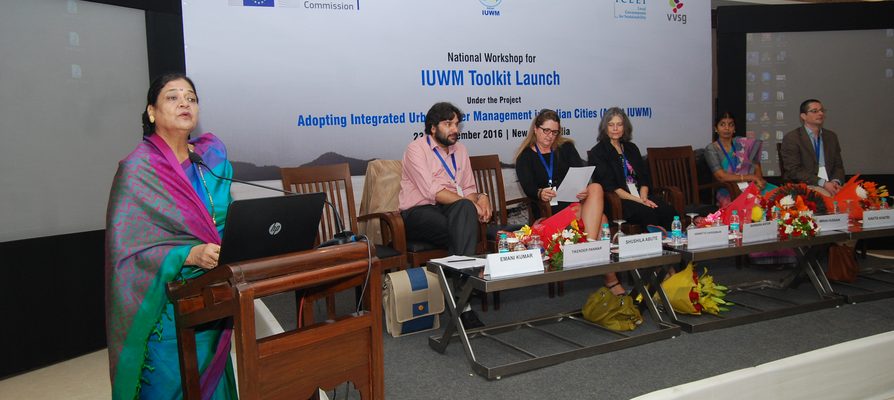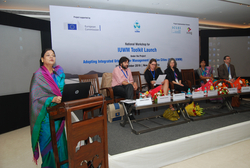Project cities share experiences on IUWM implementation at national workshop for Toolkit launch

ICLEI Local Governments for Sustainability South Asia conducted a national level workshop on November 23 and 24 to launch the final draft for the Integrated Urban Water Management Toolkit for Indian cities under the AdoptIUWM project (Adopting Integrated Urban Water Management in Indian cities). Supported by European Union and in partnership with ICLEI European Secretariat and Association of Flemish Cities and Municipalities (VVSG), the project aims at testing an IUWM framework adapted for Indian cities, based on the principles of the research project ‘Switch – Managing Water for the City of the Future’. The project involves building capacities of local governments in India to undertake water sector reforms through the adoption of IUWM based principles and practices in their planning and implementation process.
The Toolkit was launched by Shri Imran Hussain, Minister, Environment and Forest, Government of NCT of Delhi. The Minister congratulated all the team members involved in toolkit preparation and emphasized that such a toolkit would help various city and state governments in their efforts to save water. He also extended his full support to the efforts as and when needed for effective execution of the Toolkit in State of Delhi, including municipal bodies. The workshop saw representatives from 16 cities and three states, and was attended by dignitaries including Ms Henriette Faergemaan (Councillor, Environment, Energy and Climate change), and Mr. Shouvik Dutta (Senior Programme Manager) from EU, Mr. Tikender Panwar (Deputy Mayor, Shimla), Ms. Sushila Abute (Mayor, Solapur) among others.
The Toolkit structure, key tools and experiences that came from implementation of the Toolkit in four project cities were shared with the participants. All project cities (Solapur and Ichalkaranji from Maharashtra; Jaisalmer and Kishangarh from Rajasthan) shared their experience in toolkit implementation and the IUWM based Vision and Action for their city. The IUWM Action Plan for each city to achieve this Vision was also shared.
The action plan focus for each city was determined by the local context and stakeholder consultations: for Jaisalmer the focus was on conservation of traditional ponds and rain water harvesting structures, for Kishangarh on pond conservation, for Ichalkaranji on pollution of water resources and for Solapur on water quantity management. With stakeholder involvement, each city prioritized two pilot projects for implementation:
• Solapur: Recharge of abandoned borewells in a peri urban area not catered by Municipal supply using roof top harvesting, revival of defunct community toilet in a peri urban area and reuse of treated wastewater for flushing.
• Ichalkaranji: Decentralized wastewater treatment for a stretch of Kala Nallah (polluted by a mix of untreated domestic and industrial wastewater) and closing the water loop at the level of a slum along the banks of Kala Nallah to reduce the pollutant load on the Nallah
• Jaisalmer: Revival of traditional pond to conserve interlinkages between ponds in the city and door-to-door waste collection and management (composting) for two wards as a model to reduce clogging of drains in the city
• Kishangarh: Closing the water loop at the level of a school located in a slum area by community mobilization for toilet construction under Swachh Bharat Mission, capacity building of school students and construction of toilet block for girls toilet (with decentralized wastewater treatment unit, reuse of treated wastewater for gardening and roof top rain water harvesting). The second project for Kishangarh is also on door to door waste collection and management for 2 wards
The project cities also shared their interventions to further the pilot projects. These included inclusion of strategy for revival of 200 borewells under AMRUT scheme of Solapur, door to door waste collection in all wards of the city and training to Municipal sweepers on segregation in Kishangarh, SBM interventions in Jaisalmer, convergence of pond revival with Mukhyamantri Jal Swavlamban Abhiyan (MJSA) in Rajasthan, and others.
The second day of the launch workshop involved a training session on understanding of IUWM and discussions on IUWM toolkit. For the purpose of training, the participants were divided into three groups with a mix of participants across cities and across cadres. The participants were given topics for discussion based on the principles of IUWM and each group selected and discussed in detail two of these topics and how these topics (based on principles of IUWM) can be applied in their cities. Some of the topics discussed at these groups included focus on urban poor, impacts of climate change and managing urban water loop, planning, institutional integration, decentralization. Later, each group presented two such principles to the larger group at the meet. This session was particularly useful for the participants to reflect upon the application of IUWM in their city. Subsequently, each group discussed key priorities for the toolkit and how the toolkit can be applicable in their cities.
The session concluded with a vote of thanks from ICLEI South Asia and European Union to all the participants who came together for an exercise that helped each one understand the challenges of the other, thus leading to a holistic learning experience for all.
